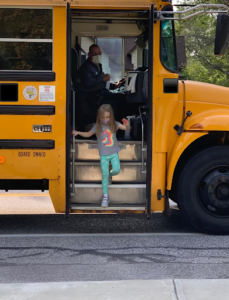
Photo caption: Miranda on a hike with her husband Robert and their daughter Sophia.
Back in September, women left the workforce at four times the rate men did according to the Labor Department. With a pandemic hitting mothers all over have been taking leaves to help support their children as they do online schooling, which caused financial difficulties for those families.
Miranda Webb, a 24-year-old nursing student, and mother, was one of many mothers who needed to continue to work to help support their families financially. Miranda has been working as an essential retail worker before the pandemic even started. While also attending Cuyahoga Community College to become a nurse, Miranda was balancing home, work, and school life very well until her husband, Robert, was let go from his job before the pandemic.
“It was hard because he was applying for all this unemployment and on top of it the pandemic unemployment,” Miranda said, “His last job was fighting it and it turned into a whole case. We had to go to a hearing for it.’
A hearing in which they in fact won. The money would have brought them more financial support during the pandemic, but they are just going to start to see that money almost a year later. During the first few months of the pandemic, Miranda helped motivate her husband into getting a job to help get a second income for their family. Which ultimately led Robert to work with her at Target.
“I work about 35 hours a week and I go to school full time,” Miranda said, “My husband works about 20 hours a week. It’s a decent income but it’s nothing special.”
A survey released by Motherly stated that among mothers living with their partners in 2020 39% reported contributing less than a quarter to the family income. Comparing that to 2019 where 41% of mothers reported contributing to half or more of the family income. Miranda, although working almost full time can’t make the same amount as her husband was before he lost his job. With them now both working at Target trying to make the amount that they were once receiving, their daughter Sophia stays home with Miranda’s grandparents.
“Having my grandparents has been a saving grace because they watched her when she wasn’t in school and when we are working,” Miranda said, “I don’t know how we would’ve gotten past anything if it wasn’t for their help because we can’t even afford an apartment. It would have drained out money really fast to live on our own and feed everyone.”

Sophia and her Grandfather making paper airplanes while they wait for mom and dad to come home from work.
Sophia started kindergarten in the fall of 2020. She was full-time online schooling from 7 am to 3 pm, and had homework to do after. She has her own chrome book that the school gave to her to log on to and attend class. It wasn’t normal but it got easier until October hit.
“I lost my taste and smell for a few days. I had a severe headache kinda like a migraine and I was achy,” Miranda explains her sickness,” Both of my grandparents had it. I wasn’t allowed to test for it but I definitely had it. It really made it difficult being out of work for two weeks and our daughter being out of school.”
After quarantining the entire family things got back on track, sorta. In January Sophia went back to being in school full-time which caused a stain on Miranda.

Sophia getting off the school bus after her first day of school.
“Between school and work, I really needed help from other people,” Miranda said, “I felt like I just wanted to drop out and just give up already. I felt like I’m failing my daughter because she is not where she needs to be in kindergarten. She is just starting and she hates school and it’s really rough. I kept pushing. I kept asking her teachers what I could do and asked people for help. I could only imagine not having that help that I have and how difficult that would be.”
1 in 4 women and 1 in 3 mothers are considering scaling back or leaving the workforce altogether says The Muse article they released in 2020. Miranda, who is set to graduate in May, says that although it would be nice to be able to be home and take care of her family in a traditional sense, she needs to work to help support them financially. As a nurse, she will be able to get a better-paying job which can get them to where they no longer will worry about the household income.